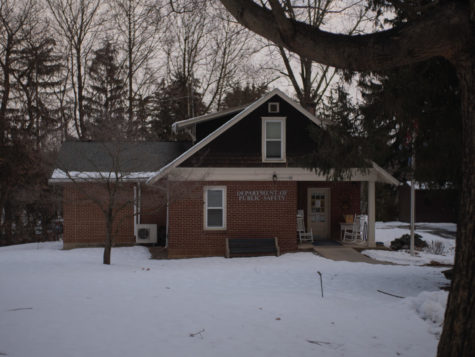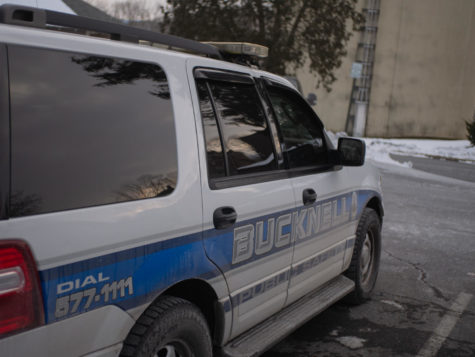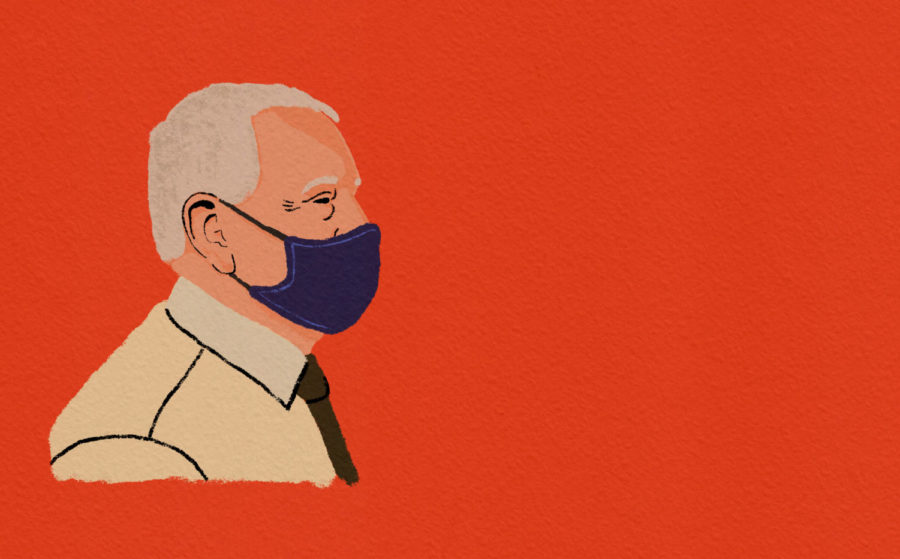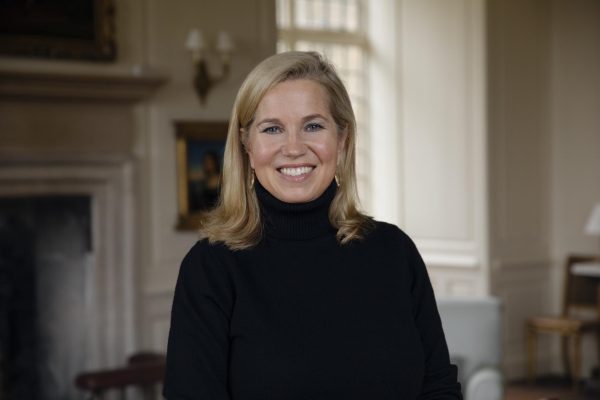It’s all about trust: As Chief of Public Safety, Steve Barilar worked to build it— how did he do?
As Chief of Public Safety, Steve Barilar worked to build it— how did he do?
During an interview with outgoing Chief of Public Safety Steve Barilar on Jan. 18th, the editorial staff of the Bucknellian briefly chatted with Barilar about campus, post-graduation plans, and the paper. As with most interviews we conduct, we explained that the story would be out the following Friday.
“I’ll be gone by then,” Barilar added, smiling slightly. He was moving to Florida, after all.
Just hours after our interview concluded, news broke of a lawsuit against the University. Earlier in January, the University was sued by former Public Safety officer Colby Snook in an employment dispute, filed under the Pa. Whistleblower Law at the Union County courthouse. Crucially, the lawsuit implicated the Chief himself; Barilar was accused of permitting a student “to destroy potentially relevant evidence” while under investigation for harassing a female student in a restroom in May 2021.
Throughout our interview last week, Barilar proved upbeat and easygoing. He opened the door — squint and raised cheeks betraying a mask-hidden smile — and showed the way into his office. Priding himself on keeping his interview short and to the point, we barely had time to set up the audio recorder before the conversation began.
Of all the things Chief Barilar mentioned through our 45 minutes together, he spoke most of the trust among students, and culture among officers, he worked to create during his time here. He described it as a holistic, everyday approach.
“As much as I hate to say it,” Barilar continued, “the only good thing I can say to happen out of Covid is more students got to know Public Safety because we were doing a […] ton of transporting. So they got to meet us, and they got to talk to us [at] a time that there was a lot of stress for them.”
Barilar has found the same sentiment among other officers in the department, who all want to make Bucknell “a safe community where students feel comfortable saying, ‘Hey, I need a hand.’”
“The officers here would do anything for the students,” he added.
One of the reasons Barilar mentioned enjoying his work with students was that the options aren’t simply “arrest” or “don’t arrest.”
Speaking to the University’s judicial review process, he explained that Public Safety “should be preparing people for the real world… People do make mistakes. If they make mistakes, correct that mistake, and let that person move on.”
“We shouldn’t be looking to ruin anybody’s life.”
“Now, a sexual assault or an assault, that’s a different thing: those should go criminal, he quickly added. “But when you’re looking at minor offenses, it’s really nice to have where you can do an educational piece.”
When we asked Barilar about his most memorable learning experience on campus, he told us it was “an open house at the 7th Street House.” The 7th Street House, at the corner of Moore Avenue, is the Umoja affinity, whose mission “is to convene Black people and other people of color in order to create an environment where minorities feel welcomed and comfortable on Bucknell’s campus,” according to Bucknell’s site.
“We brought the chief of Buffalo Valley [Regional] Police into that meeting,” Barilar explained, “and just had an open house discussion with those students telling us about their life experiences with law enforcement.”
“I’ll be honest: I came here, I’d say, a little naïve, thinking that all cops are good and people look at police as all being good. It wasn’t until I sat down and listened to students tell their stories of their life experience that I realized, ‘You know, we need to change.’”
He clarified that reform efforts in the department weren’t simply in response to national movements for police reform that began in June 2020. Instead, Barilar said, “it’s been longer than that, that we’ve really gone and tried to get trained, educated, and to earn the trust and respect of students.”
But not all students have expressed trust in Public Safety in recent memory. On May 13, 2021, a large group of students attempted to break into the University’s dedicated LGBTQ+ housing – now called Fran’s House – despite repeated requests from the residents for them to leave. The house’s RA Tyler Luong alleged that night the group was “banging against our doors and windows , swing[ing] a metal bar at our flag pole that displays our pride flag,” as well as “urinat[ing] on our front porch.”

When Public Safety officers arrived on scene, they allegedly fraternized openly with those trying to break in, “laugh[ing] at the situation” and promised that the students would “get access to [Fran’s House] when finals week was over, shaking each and every one of their hands.”
“We make progress,” Barilar recounted, “and then sometimes things happen, and we’ve gotta start all over again.”
In regard to the incident at Fran’s House that occurred on May 13, he observed that “Fran’s House called us that day. That’s a huge step. Years ago, that would not happen; they would not have called Public Safety.”
“So, we are doing good. Did some things wrong, we gotta do better… Acknowledge when we make mistakes, because we’re not perfect, and then just do better.”
Overall, Barilar was encouraged by the trust built between “PSafe” and the student body. “To me, if students are calling us, then we’re doing it right, we’re earning that respect,” he said. “We’re not always going to be perfect, but we sure as hell better work on it.”
News broke of former officer Colby Snook’s lawsuit just a few hours after the Bucknellian’s interview with Barilar, in the afternoon hours of Jan. 18.
Snook alleges that he responded to a call on May 17, 2021 around 2 a.m., in which the caller claimed that a male student was “trespassing and subsequently harassing a female student in a female restroom.” The victim stated that the male student “used his cell phone to invade her privacy.”
Public Safety logs from that night indeed indicate an incident of stalking at McDonnell Hall at 2:09 a.m., as well as two additional instances of harassment of communications that same day.
The alleged culprit’s phone was placed into evidence at Public Safety headquarters on Snake Road, behind Trax Hall. Snook alleges that Barilar then met with the parents of the male suspect.
According to Snook, Barilar subsequently gave the student permission to access his phone. When the student later retrieved their phone from evidence, in the presence of both Barilar and Sergeant Darryl Fisher, the student revealed that “the files [were] gone.” Fisher was the only officer who had a key to the evidence locker at the time, according to the complaint, and protested Barilar’s order to surrender the phone to the student.
According to Snook, the student was able to factory reset his iPhone after it was confiscated. Such a reset would completely eliminate all existing information – including photos, text messages and contacts – stored on the phone’s memory.
Another officer applied for a warrant to search the student’s phone, and several weeks later, according to the complaint, Snook learned the Pennsylvania State Police found the phone wiping program “was downloaded while the phone was inside Bucknell’s Public Safety Office.”
Snook states he then reached out to Bucknell’s Executive Director of Human Resources Services, Marcia Cooney, about “a sensitive matter… regarding Chief Barilar.”
Snook claims that after he learned that the specific male student “was a suspect in multiple similar incidents where female students were victimized,” Snook also contacted the District Attorney of Union County, who is said to have referred it to the state Attorney General’s office.
The Pennsylvania Attorney General’s office declined to comment.
After allegedly meeting with the University’s General Counsel and Chief of Staff Karin Rilley, Snook notes that Rilley “became visibly angry,” and “threatened Snook about his future employment with Bucknell” while indicating that “his actions did not have the best interests of the university in mind.”
Snook allegedly repeatedly reached out to Cooney to describe deteriorating circumstances for him in the Department, including hostility and fears of job security. He states he was only later informed that he was supposed to report misconduct to Vice President of Finance & Administration Eileen Petula.
After a meeting with Cooney and Vice President of Human Resources Pierre Joanis, Snook described anxiety induced by “what [he] reasonably believed to be threats by Bucknell that his whistleblowing was not viewed favorably.”
Two officers resigned that summer: Sgt. Fisher, who allegedly protested Barilar’s order to surrender the student’s phone, and Corporal Paul Shipton, who allegedly responded with Snook to the May 17 incident. And while Barilar reportedly told Snook that the male suspect withdrew from Bucknell, in November 2021 the former officer learned that the student is still active at the University.
Snook resigned that same month.
In short, Snook’s lawsuit alleges that Bucknell, through both the Public Safety and Human Resources offices, retaliated against him for ‘blowing the whistle’ about potential misconduct at the University.
Speaking over email, Barilar declined to comment on the lawsuit.
Stephen J. Barilar came to Bucknell in 2011, after a 26-year stint with the Pennsylvania State Police. “What do I know?” he asked himself upon retirement from the state police at 48. “I know law enforcement. So I actually came here as a night shift supervisor.”
The next year, in 2012, Barilar became the University’s Chief of Public Safety. Speaking to the Bucknellian that year, he said “In all of police work, the biggest challenge is to ensure the protection and safety of everyone in our community.”
Some of his first shifts were 7 p.m. to 3 a.m. on “House Party Weekend.” A notorious and now-defunct “uphill” event coordinated between fraternities and University officials, President Bravman announced its cancellation in 2013 after multiple hospitalizations and arrests among the student body. Barilar remembered, “when everybody kept warning me about Bucknell’s house party, I’m thinking, ‘here we go’.”
A 2013 email response from Barilar reflected this exasperation, noting to the Bucknellian that “The size and scope of House Party Weekend typically required us to have all of our officers on duty for at least a portion of the weekend. To put that in perspective, that’s about three times the coverage of an average weekend on campus.”
Both then and now, though, he contrasted the “tame” hijinks of House Party Weekend with those of nearby Bloomsburg. “It was kind of like a picnic compared to the Bloomsburg block party. I mean, here, students are just so polite. It really wasn’t as bad as what I had seen in the past.”
Compared to his time on the State Police, Barilar also found working at Bucknell to be significantly different.
“You have people make mistakes,” Barilar explained, “but generally people are pretty much honest. They’ll stand up and say, ‘Yes, I did do this, I made a mistake here’ as opposed to the career criminals who would deny everything.”
Snook’s lawsuit, though, is not the first time that Barilar’s conduct has been under the microscope.
In 2000, Barilar’s wife was pulled over by State Trooper William T. Shugarts for speeding, according to a 2009 federal ruling. After Shugarts wrote a ticket, eventually Barilar — who was Lieutenant at the time with the Pennsylvania State Police — spoke to Shugarts on the phone. They did not know each other previously.
Shugarts argued that “Barilar asked him to get rid of his wife’s ticket,” while defendants in the lawsuit said Barilar lacked “any ulterior motive whatsoever in contacting the state trooper who pulled over his wife.”
At the traffic trial of Barilar’s wife, Shugarts “intentionally presented a sloppy case,” according to court documents. He said this was because “he felt pressured to help Lt. Barilar’s wife,” but nonetheless felt the sum of the evidence “would be sufficient for a finding of guilt.”
The judge “suspect[ed] the case was being fixed,” dropped the charges, and called in Shugarts’ supervisor. The supervisor submitted a complaint.
Barilar “was charged with Intimidation of Witness and Obstruction of the Administration of Justice,” but those charges were also dropped due to contradictions in Shugarts’ story.
These facts were established in a lawsuit, Shugarts v. Tripp, where Shugarts claims that his free speech and equal protection rights were violated after being fired from the Pennsylvania State Police. That lawsuit was dismissed.
Through Barilar’s time at Bucknell, though, the habits of the student body began to shift.
“When I first came here,” he said, “the majority of the parties were on campus. Now, you almost never see any registered parties; everything is downtown now, and it’s pretty much dictated by Greek life.”
Barilar noted the effects of downtown parties’ association with Greek life could have on the campus.
“Yes, there’s some athletic teams [downtown], but it’s by and large Greek Life. And I could see some benefits to, maybe, see somebody else have that control down there [downtown] and see if it would change the atmosphere on campus.”
Why? When parties move downtown, Barilar said, Public Safety loses the ability to mediate on students’ behalf.
“I have zero control over downtown. I have no authority once you get off campus,” so, Barilar explained, “now, you’re losing that educational part of it that we could do” because those parties have predominantly moved downtown.
He noted that one of the consequences of the Greek move downtown, compounded with the pandemic, was the increase in alcohol-related transports.
In November 2021, Barilar told the Bucknellian, “there have been 47 alcohol overdoses at this time period compared to 28 at this time period in 2020. That trend may reflect a troubling national trend showing alcohol consumption has increased during the COVID-19 pandemic.”
“However,” he continued, “the majority of the calls for public safety transports due to student intoxication are as a result of students calling concerned about the welfare of another student, which is very positive.”
Last week, Barilar’s voice softened as he discussed the circumstances for those transports.
“If our numbers [for alcohol-related transports] are real high, and we have a lot of— they might fear someone’s gonna die,” he said.

Due to the pandemic, Barilar reflected, “the coping mechanism a lot of people turn to is alcohol and drugs… the numbers are saying there’s a problem out here that needs to be addressed.”
And in response to those increased transports, Barilar again emphasized the benefits of Public Safety’s resolution process.
“The referrals are an educational piece. It’s not a piece to try and jam people, but to hopefully learn from mistakes,” he explained.
He references the Medical Amnesty policy, which can apply if students seek “immediate medical assistance for their members or guests when any potential health risk is observed, including medical emergencies related to the consumption or use of alcohol or drugs.” In those cases, where a negative mark would usually be placed on a student’s conduct record, those students can instead be referred to counseling and educational opportunities.
“I’ve heard talk about going to more of a restorative justice program,” Barilar continued, and “going to that program, it might be a way to change behaviors. I’d love to see that.”
In addition to having all the powers to arrest and detain possessed by any Pennsylvania police officer, Public Safety officers also usually carry a regulation firearm.
Barilar reported that those firearms have never been discharged outside of training, not only during his time here, but since Public Safety officers at Bucknell were armed.
When explaining why Public Safety officers are armed, he leaned forward on his desk, quickly exhaled and then looked up intently.
“We don’t ever want to have a Virginia Tech happen here,” he said. “The last thing myself or my officers would want is for us to be standing by while people are being held, hurt, or killed, and we have no way to help them. It would break our hearts.”
In April 2007 at Virginia Tech in Blacksburg, VA, 32 people were killed by senior Seung-Hui Cho. It remains the deadliest school shooting in U.S. history.
“If [Public Safety] being armed has prevented that from happening, or has prevented any actions from happening, then that is phenomenal.”
In 2013 Barilar felt similarly, telling the Philadelphia Inquirer, “You hate to say it, but society as it is, the school shootings… you want people trained who can respond as quickly as possible.”
Anticipating a question on whether Public Safety needs firearms if they’ve never been used, he spoke about violent crime that has happened near campus.
“Since I’ve been here,” Barilar said, “we’ve had a shooting that happened behind the Comfort Inn & Suites. We had a guy pull a gun on students on the intersection of Saint George and 6th Street. We had a person stabbed to his death on South 7th Street. So we can’t say that we live in our Bucknell bubble and nothing happens here.”
“I mean, we live in a world where there are threats, and if [Public Safety] being armed has prevented things from happening here, that’s a win,” he said.
As Barilar’s tenure as Bucknell’s Chief of Public Safety approached its end, we noted incoming Chief of Public Safety Anthony Morgan is scheduled to begin work on Feb. 1.
“I’ve talked to Anthony a number of times,” Barilar responded quickly. “He sounds phenomenal, a great people person, who really wants to come in and get to know the students.”
But after we asked Barilar how he wishes to be remembered by the University, he hesitated a moment.
“I hope that I can say that I’ve earned the students’ trust. I mean I’ve had students call me at home, you know. I just—,” Barilar said, pausing again. “Looking back, it’s been a great experience for me.”
Save his three days off during last spring semester, “I was working probably 10-to-12-hour days, and that’s because of how much I care for the students.”
“I hope I leave campus with people looking at Public Safety differently,” he explained, “and looking at us as being a resource, and somebody that they would reach out, and that they would trust.”
“God knows that’s the number one thing I’ve been trying to do for years.”
























MN • Feb 12, 2022 at 12:51 pm
https://www.northcentralpa.com/news/crime/bucknell-retains-former-public-safety-chief-as-counsel-despite-corruption-allegations/article_392f7a7e-8b43-11ec-b21d-3ffbb7d3af99.html
MN • Feb 9, 2022 at 9:25 am
Barilar did NOT retire… he is working as special advisor to general council at Bucknell.
MN • Feb 11, 2022 at 10:50 pm
News just broke of this… corruption at its finest!
https://www.northcentralpa.com/news/crime/bucknell-retains-former-public-safety-chief-as-counsel-despite-corruption-allegations/article_392f7a7e-8b43-11ec-b21d-3ffbb7d3af99.html
SL • Jan 30, 2022 at 9:47 pm
The Clery Act requires institutions to give timely warnings of crimes that represent a threat to the safety of students or employees.
The law is named after Jeanne Clery, a 19-year-old Lehigh University student who was raped and murdered in her campus residence hall in 1986. Her murder triggered a backlash against unreported crime on campuses across the country.
Rt • Jan 30, 2022 at 8:00 pm
Rarely have I been as disappointed in bucknell as in this. There is A PEEPING TOM VOYEUR enrolled and nobody in the administration seems to care.
CR • Jan 30, 2022 at 11:42 am
Special Agents from the PA Attorney General’s Office were reportedly on campus, investigating Barilar’s misconduct related to the tampering with evidence allegation that the Union County Distinct Attorney was made aware of.
Josephina BB • Jan 29, 2022 at 4:59 pm
So disheartening! I’d be p*ssed off big time if I was a victim on this campus or any other.
Here’s some food for thought: Why don’t the victims have a say in terms of a case being prosecuted criminally??? (not solely the Chief of public safety deciding it)
Nice reporting job by The Bucknellian staff. Very thorough and eye opening. Keep on this!
C • Jan 30, 2022 at 9:37 am
https://www.northcentralpa.com/news/crime/former-bucknell-public-safety-officer-sues-university-for-violating-whistleblower-law/article_d6fe80fc-7747-11ec-a391-bb4bb89ece96.html
Sophia K • Jan 29, 2022 at 4:49 pm
Wow! Only 4 comments???
Why isn’t this story getting more interest? These alleged incidents – and probably more the public does not know about – are absolutely unacceptable!
Why isn’t local press picking up this story? I’ve read nothing about this in local papers…Daily Item, Press Enterprise, Standard Journal- hello??? Maybe this is just “standard”, basic, every day, acceptable “news” anymore. Sad.
A • Jan 28, 2022 at 11:45 pm
Hope the new Chief and officers focus on the important things like sexual assault and stalking instead of students drinking in dorms not bothering anyone and Greek life as a whole
JE • Jan 28, 2022 at 4:35 pm
According to court documents, Officer Snook’s attorney (Scott Pollins) is a Bucknell University Alumni – At least someone with Bucknell roots is standing up for the female students who were victimized in this case.
John Edwards • Jan 28, 2022 at 2:13 pm
Barilar states in the article that no firearm was ever discharged outside of training. Another false truth that Barilar puts out there to make his leadership look good. Public Safety Officer Cooke recently fired his university firearm while on duty, but that was swept under the rug like several other things within PSafe.
AF • Jan 28, 2022 at 12:59 pm
Thank you for including the information about the recently revealed allegations against Barilar. I hope you will follow up on this story and continue to shed light on this concerning issue and continue to update the Bucknell community. The current lack of justice for the victims is distressing.